Gingivitis Treatment
Undergo a comprehensive gingivitis treatment, which consists of professional and friendly consultants at the ID Dent clinic in Kyiv. The procedures are absolutely painless, do not cause any discomfort, and the prices are favorable for the client. Take advantage of our promotions and save up to 30% on treatment.
| Visual Examination | around 2 weeks |
| Evaluation and Diagnostics | visual, x-ray |
| Symptoms | swelling, redness |
| Treatment Methods | antibiotics, antiseptics |
| Prophylaxis | hygiene, regular check-ups |

Gum inflammation is a common issue that people often overlook, delaying dental visits. When there’s no toothache, one might attempt to address the inflammation process independently. Gingivitis is a frequent cause of healthy tooth loss. Gum inflammation... Read more
Gum inflammation is a common issue that people often overlook, delaying dental visits. When there’s no toothache, one might attempt to address the inflammation process independently. Gingivitis is a frequent cause of healthy tooth loss. Gum inflammation can often be recognized visually, requiring only a quick dentist check, yet diagnosis remains crucial.
Gingivitis treatment starts primarily with hygienic procedures, such as professional dental cleaning. This procedure involves removing hard and soft dental deposits. Manual tools, an ultrasonic scaler, or air-polishing methods are often used.
You can undergo affordable gingivitis treatment at our ID Dent dental clinic in Kyiv (Lesnoy housing area). If you noticed swelling, redness, or experienced gum pain, don’t hesitate to book an appointment with our dental clinic specialist.

Gingivitis is an initially localized inflammation of the mucous membranes of the gum ridge, becoming generalized. Typically, there is soft (non-mineralized) plaque, food particles, and rarely tartar. The severity of the gum process is directly proportional to oral hygiene.
Noticed blood during tooth brushing? You may have gingivitis. A very common inflammatory disease, characterized by bleeding, swelling, and sore gums. The disease can significantly impair quality of life, gradually becoming chronic and causing complications. So, if faced with gingivitis, do not postpone treatment. Dentists of ID Dent clinic know how to solve this problem. We provide gingivitis treatment effectively, quickly, and without pain!
Causes of Gingivitis
Gingivitis is the most commonly occurring gum disease. It may arise in patients at different life stages: in both adult and pediatric ages. Various factors trigger gingivitis, including:
- Improper oral care – insufficient or incorrect teeth brushing can lead to the accumulation of bacteria and disturbance of microorganisms’ balance in the oral cavity, ultimately resulting in gingivitis development.
- Bad habits (smoking). Smoking is a major cause of gingivitis. Nicotine and other toxins from tobacco smoke can cause gum inflammation and worsen oral blood circulation. Even with regular brushing.
- Diabetes – a chronic disease that can lead to various health issues, including gum gingivitis. People with diabetes have elevated blood sugar levels, providing an environment that promotes infections and worsens the condition of oral soft tissues.
- Some medications – antidepressants, immunosuppressants, and anti-cancer drugs may negatively affect gum health.
Pregnancy is a risk factor for gingivitis appearance. Hormonal shifts during pregnancy can cause changes in gum condition. Pregnant women should regularly visit dentists: the doctor will provide necessary prevention assistance.
Other causes of gum inflammation include frequent stress and improper diet. Consuming sugar, acidic drinks, and fatty food can increase bacterial accumulation in the oral cavity and harm gums. During stress periods, hormonal levels may change, affecting the health of the oral soft tissues.
How to Understand You Have Gingivitis?
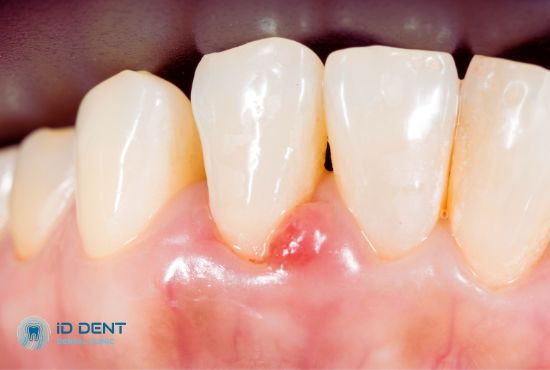
Gingivitis is a gum disease manifesting as various symptoms. However, not all symptoms may be apparent, complicating diagnosis. The most common warnings:
- Bleeding gums – a primary sign. While brushing or chewing, you might notice blood on the toothbrush or in the mouth. Additionally, gums may be painful to touch, sensitive to hot and cold foods.
- Swollen gums – soft tissues appear enlarged.
- Bad breath – gingivitis-causing bacteria also cause foul odor.
- Color changes in gums – during illness, soft oral tissues may change color to red or purple. It may relate to inflammation and blood circulation disorder.
- Appearance of notch on teeth – this relates to bacterial buildup.
If you notice even one of these symptoms, consult a dentist for diagnosis and treatment planning. Early detection of gingivitis can help prevent more serious oral health diseases, including periodontitis.
Diagnosis of Disease
For proper gingivitis treatment, the dentist must conduct comprehensive oral diagnostics, including:
- Visual inspection – the dentist examines gums, teeth, and tongue for signs of inflammation, bleeding, or other disease symptoms. This includes assessing the disease’s severity.
- Measuring depth of gum pockets. Normal depth varies from 1 to 3 mm, while gingivitis increases it significantly.
- X-ray examination. X-ray images of teeth help assess tooth and gum damage extent, and identify other oral health problems, which can exacerbate gingivitis.
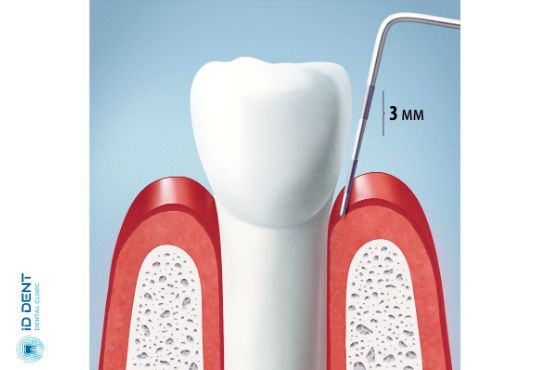
Additionally, oral flora bacterial analysis might be conducted. It helps determine bacteria types causing gingivitis.
Forms
Two main forms of gingivitis are distinguished:
- chronic;
- acute.
Acute gingivitis features pronounced symptom severity and usually causes sharp pain, significantly easing its diagnosis. Conversely, chronic gingivitis largely lacks pain and has minor symptom severity.
It is crucial to remember that both acute and chronic gingivitis are serious diseases requiring competent and timely treatment.
Types of Gingivitis
Depending on causes and symptoms, such types of gingivitis are distinguished:
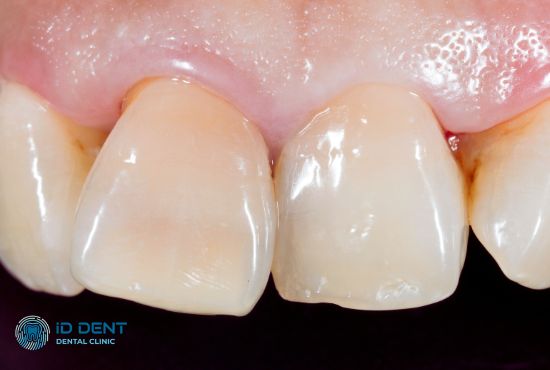
- Cataral – is the most common form of gingivitis. It involves superficial gum inflammation, which may manifest as bleeding, redness, and slight swelling. It doesn’t cause severe pain and is usually treated easily.
- Granular – involves the formation of granules on the gums. It can cause gum soreness and swelling.
- Necrotic – is the most severe form of gingivitis. It features gum necrosis, which may lead to ulcers and deep wounds. Causes severe pain, bleeding, and foul odor from the mouth.
- Aphthous – involves the formation of painful ulcers on gums, which can stem from certain bacterial or viral infections. Aphthous gingivitis can cause severe pain and eating difficulties.
- Hyperplastic – involves a sharp increase in gum volume, which can disrupt dental occlusion. This gingivitis form is often linked to metabolic disorders or medication intake.
Each gingivitis form requires an individual treatment approach. Therefore, don’t delay visiting the doctor.
Gingivitis Treatment Methods
Gum inflammation, regardless of its type and form, can cause serious oral health issues. Therefore, visiting a dentist is essential with the first disease signs.
Gingivitis treatment depends on its form and severity. The following methods may be used:
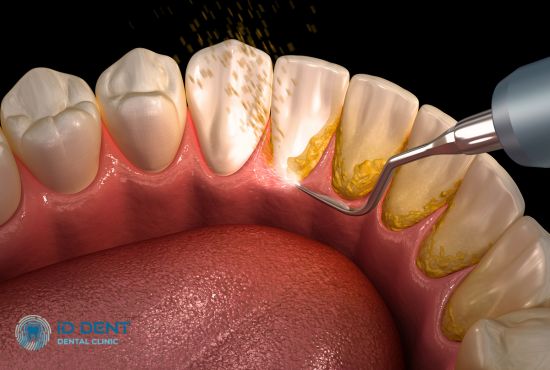
- Dental plaque removal – one of the primary gingivitis treatment methods is the removal of dental deposits, leading to gum inflammation development.
- Use of antiseptic agents to destroy oral bacteria. These agents include chlorhexidine, miramistin, hydrogen peroxide, and others.
- Use of anti-inflammatory medications. They help reduce gum inflammation and lessen pain.
- Antibiotic use – severe gingivitis or bacterial infection joining may require antibiotic use. Antibacterial drugs help prevent complications.
- Surgical treatment – some gingivitis forms may require surgical treatment, such as removing granules or necrotic tissues, correcting the gum line.
Gingivitis treatment should be comprehensive and prescribed according to the severity of the disease. Early detection and comprehensive therapy can help avoid developing more serious oral health issues.
What to Do to Prevent Gingivitis?
Consider basic gingivitis prevention methods:
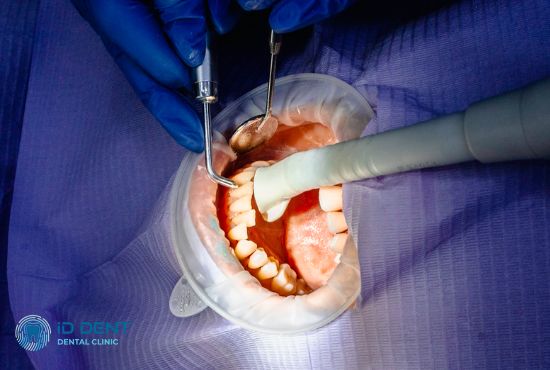
- Regular brushing – twice daily. Thorough oral care is the main gingivitis prevention method. Tooth brushing helps remove bacterial plaque, which may lead to disease development.
- Dental floss use – helps remove bacterial plaque from interdental spaces inaccessible to a toothbrush. Floss is recommended at least once a day, ideally before sleep.
- Regular dental visits – every 6 months. Timely dentist visits help detect early gingivitis signs and halt the disease’s progress. Additionally, the doctor will conduct professional hygiene, essential for healthy teeth.
- Balanced diet – proper nutrition helps strengthen gum health and is beneficial to the body. It is recommended to consume more fresh vegetables, fruits, and reduce sweets and alcohol intake.
- Avoiding smoking – smoking contributes to gingivitis development, as nicotine constricts blood vessels, hindering blood flow to gums. Reducing smoking quantity helps preserve gum health and prevent disease development.
Following these simple rules, you can significantly reduce the disease risk.
Peculiarities of Disease Progress in Children
Children’s gum gingivitis is quite common, as the child’s body is highly susceptible to diseases. The disease’s most common cause is insufficient teeth cleaning – the child may simply not know how to brush teeth properly. Therefore, parental control is necessary: teach the child how to care for the oral cavity properly, exemplify the importance of tooth brushing.
Cost of Gingivitis Treatment in Kyiv at ID Dent
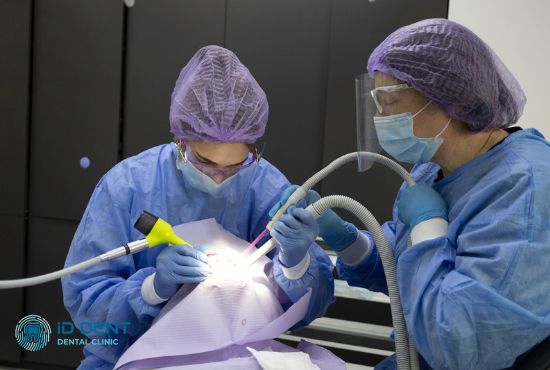
The cost of gingivitis treatment may vary considerably depending on various factors. We at ID Dent dental clinic care about providing exceptionally high-quality treatment at a reasonable price. Therapy cost depends on gingivitis form and type, and each patient’s clinical situation specifics. Approximate prices are listed on our above-website. For more detailed information on the treatment cost and doctors’ consultations, please contact us.
Experiencing gum problems? We are happy to invite you to our ID Dent dental clinic. We employ experienced doctors using modern diagnostic and treatment equipment for patients. We guarantee therapy quality and individual patient approach.
Medical center ID Dent is located on the left bank of the Dnieper, in the Lesnoy residential area. It is convenient to reach us, as Lesnaya and Chernigovskaya metro stations are nearby.
Don’t postpone caring for your teeth and gums to later, contact us for quality consultation and treatment. We invite you for gingivitis treatment in Kyiv!
List of References:
- Janushevich O.O. Periodontal diseases. Treatment. Practical medicine. – 2014. – 180p.
- Gianno Ricci. Diagnosis and treatment of periodontal diseases. Azbuka – 2015.- 739p.
- Grudyanov A.I. Periodontal diseases. Medical Information Agency. – 2009. – 336p.
Frequently asked Questions
How dangerous is gingivitis?
If left untreated, gingivitis may progress to periodontitis, wherein not only gums but also bone tissue is damaged. This is a very dangerous condition, untreated in advanced stages and may lead to tooth loss. The challenge is that gingivitis can be asymptomatic initially.
How long does it take to treat gingivitis?
Improvement is noticeable a few days after starting proper treatment, and the full therapy course lasts about two weeks. The treatment is outpatient – meaning you stay at home, visiting the dentist for check-ups and therapy adjustments.
Can you cure gingivitis?
Yes, but only if the treatment is under a dentist’s supervision. Self-treatment may only partially relieve symptoms, potentially further developing into ulcerative and necrotic forms. However, even advanced gingivitis can be fully resolved post-dental procedures.
How much does gingivitis treatment cost?
Gingivitis treatment cost varies based on disease severity and specific applied treatment methods. An individual dentist consultation is necessary to get a precise treatment and cost estimation.
What causes gingivitis?
Gingivitis is caused by poor oral hygiene, bacterial infection, and other factors like smoking, stress, poor diet, related health issues. Regardless of the cause, it's crucial to consult a doctor promptly.
How quickly can you treat gingivitis?
Gingivitis treatment duration depends on severity and applied methods. Generally, treatment takes several days or weeks, but severe cases may extend to a few months.
Can gingivitis be completely cured?
Yes, gingivitis can be completely cured with appropriately chosen treatments and consistent oral care. Seek professional help at the first symptom onset.
How to properly treat gingivitis?
Gingivitis treatment should include regular oral hygiene, antiseptic and anti-inflammatory medications, professional dental cleaning, and plaque removal. Severe cases may require antibiotics.
Can gingivitis be self-treated?
Gingivitis care requires a dental consultation for accurate treatment and oral health care advice. Self-treatment can prove ineffective, aggravating the condition. Folk remedies are also contraindicated.
What foods should be avoided with gingivitis?
With gingivitis, avoid sweet, sour, fatty, and spicy foods, which may irritate gums. Smoking and alcohol consumption must also be avoided.

 Kyiv, st. Bratislavskaya 14B
Kyiv, st. Bratislavskaya 14B Mon.-Fri. 9-20, Sat.-Sun. 10-18
Mon.-Fri. 9-20, Sat.-Sun. 10-18



